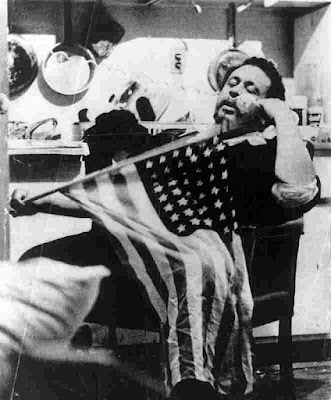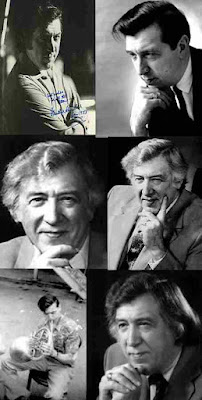
In the same way it's dangerous for a composer to write his own musical epitaph; any attempts to suggest how people ought to remember you will simply be accused of self interest.
Some composers, disappointed in their accomplishments, console themselves that they'll be resurrected, Bach-like, to great acclaim 50 years hence. Other composers, unwilling to face reality, delude themselves, Schoenberg-like, that they alone know the future. No wonder composers can be so bitter.
Suppose a composer, accutely aware of his own mortality, writes a huge, complex piece fully expecting no one will hear it until after he dies. And he tells people "I wrote it for my tombstone." And then he doesn't even finish it.
But wait. What if he's not just pissing his ego into the wind? Suppose he really is a great composer and as time passes people steadily value his music more and more. What then should we think of his own attempt to define our memories of him when there are plenty of excellent reasons to remember him anyway.
These were some of my contorted thoughts as I returned home from a rare performance of Charles Mingus' Epitaph. Yep, he named his own epitaph "Epitaph" and he described it as a symphony, although it's way beyond that.

Wednesday night Epitaph was performed at Walt Disney Concert Hall by 31 musicians, all funereally attired except for one trombonist, and conducted by Gunther Schuller. Schuller is to be commended for helping rescue Epitaph from oblivion and making it performable.
Read about this production of Epitaph here.
More about its previous history is here.
Schuller talked too much. During his first speech someone in the audience shouted "Just Play It" only to be shushed. They should have shushed Gunther instead, his commentary was longwinded and patronizing. He told us that we probably wouldn't like all of it. That's true for me - I find the opening movement curiously off-putting.
Someone asked me about the recording of the previous performances and I said "It shouldn't be your first Mingus album" - that's true but the wrong thing to say to someone who, as it turned out, already had several.

Afterwards a friend suggested that what Epitaph needs is an editor. There's just too much of it. Mingus didn't put the final polish on it. Others should feel free to sort the components into shorter, more accessible formats. Call it an "Epitaph set" (for jazzers) or an "Epitaph suite" (for the classically minded).
Either way, it will never be performed much because it requires such formidable resources - double jazz band with little added amenities like oboe, english horn, bassoon, contrabass clarinet, timpani. (The improvised bassoon solo is one of my favorite spots - played excellently with multiphonic enhancement by Michael Rabinowitz. But if they could amplify the pianos why couldn't they amplify the bassoon just a bit too?)

Finally, I had an epiphany during Epitaph. One of the sections is a well known, up-tempo Mingus tune called Better Git It In Your Soul. It was performed by a small ensemble like the ones Mingus himself led; Schuller didn't conduct that section.
During this famous, high-energy, exciting piece that I've heard countless times before and which is as much of a standard as any Mingus tune, why did I find myself crying like a baby? Tears rolling down my cheeks. No kidding. What the heck was going on here?
Later I hypothesized that I was witnessing the birth of classical music - like a new volcano breaking the surface from below. Mingus' real epitaph, the one WE actually remember him by, is not his complex "I'll prove I'm a serious composer" works. What he will be remembered for are his pieces that people can enjoy and understand immediately. He wrote many pieces like that - and when I heard this one in a fine concert hall constructed especially for the classics (a different sort of classics but still the classics) it felt monumental.
People get to choose which music becomes "classical". They pick music because they want to remember it, share it, learn from it, be friends with it. At that moment I knew Better Git It In Your Soul is a classical piece that belonged in Disney Hall every bit as much as Beethoven. Maybe more.
My previous post on why Mingus is one of my favorite composers is here.
Another Mixed Meters post describing the previous time I cried at a concert.

Addendum from a 1982 letter to Thomas Oboe Lee from Gunther Schuller, posted on the Internet here:
The history of music is rampant with examples of composers who were overrated and over-praised in their time only to be forgotten later and, the reverse of that, neglected composers finally discovered after their time. Then there is the classic difference between a composer's own conception of the validity of his work on the one hand, and his contemporaries' perception of his work...
Young Gunther Schuller Photograph from Encyclopædia Britannica Online Other Gunther pictures from here and here or here and elsewhere. The picture of George "War" Bush came from here.
Tombstone Tags: Charles Mingus. . . Epitaph. . . Mingus Epitaph. . . Gunther Schuller. . . classical music. . . jazz